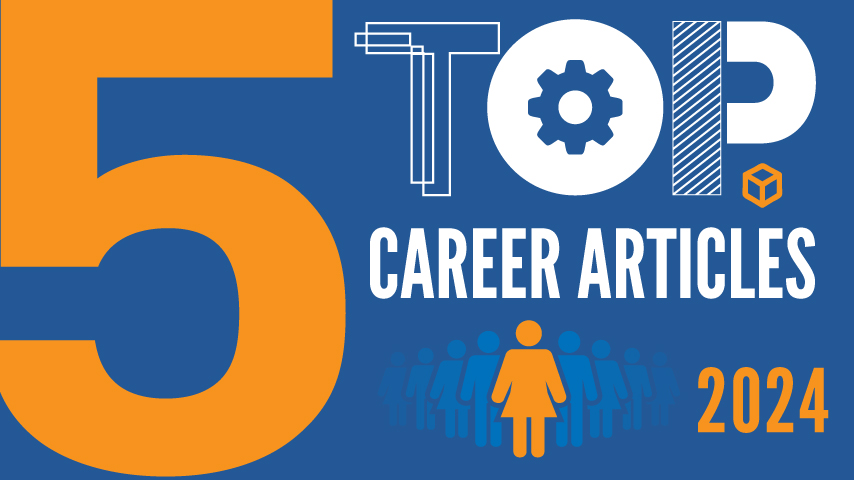Top 5 Career Articles of 2024
Top 5 Career Articles of 2024


To consistently meet client expectations, engineers prioritize their technical education and training. But that mindset often doesn’t allow much consideration of their career-related decision making.
A foundational part of any engineer’s career is the need to make decisions using the information that is presented. The technical decisions they make are obviously important.
But it is often the choices that they make and this prioritization that leave little time when it comes to their career expectation in the area of soft-skill and career-related decision making.
Because of this, ASME.org presents career-related articles. Here are 2024’s top five.
The most common statistic cited around the attrition rate for engineering students is that roughly 50 percent change majors or drop out before graduation. About half of the attrition happens during freshman year. Students come out of high school excited about wanting to design and build things, only to find themselves disappointed at having to devote two years of study to foundational courses before that can happen. That’s why it’s critical to concentrate on retaining first-year engineer students.
When faced with a difficult problem, engineers often instinctively attack it from the straightforward perspective of determining the best way to solve it in as little time as possible. Negotiations introduce nuance that requires more than fundamental logic. It requires creative exploration of approaches that may not always be simple or purely ‘efficient.’ Finding the optimum answer adds complexity that can be uncomfortable for people unfamiliar with or intimidated by the negotiation process.
According to the National Science Foundation, nearly 7 percent of research doctorates awarded in the U.S. in 2022 went to people over the age of 45. It can obviously be done. But is it something you should do? There are many reasons that an experienced professional may want to pursue a Ph.D. Getting a Ph.D. may be a lifelong dream for some people, and for others it could represent a path to a second, third, or fourth career.
The Federal Reserve System recently said that 73 percent of those who studied engineering said the benefits of education exceeded the costs—the highest of any field of study. Engineers thought the benefit of their education exceeded the cost, so there was little regret, but how about later on, when their engineering career was in full swing? Engineers may not be able to avoid it, but there are ways to look back, wish you had done it differently, and still come out ahead.
But it is often the choices that they make and this prioritization that leave little time when it comes to their career expectation in the area of soft-skill and career-related decision making.
Because of this, ASME.org presents career-related articles. Here are 2024’s top five.
Engineering Students Quit, But Retention Tactics Abound
The most common statistic cited around the attrition rate for engineering students is that roughly 50 percent change majors or drop out before graduation. About half of the attrition happens during freshman year. Students come out of high school excited about wanting to design and build things, only to find themselves disappointed at having to devote two years of study to foundational courses before that can happen. That’s why it’s critical to concentrate on retaining first-year engineer students.
6 Ways Engineers Can Become Better Negotiators
When faced with a difficult problem, engineers often instinctively attack it from the straightforward perspective of determining the best way to solve it in as little time as possible. Negotiations introduce nuance that requires more than fundamental logic. It requires creative exploration of approaches that may not always be simple or purely ‘efficient.’ Finding the optimum answer adds complexity that can be uncomfortable for people unfamiliar with or intimidated by the negotiation process.
Fulfilling a Dream: The Late-in-Life Ph.D.
According to the National Science Foundation, nearly 7 percent of research doctorates awarded in the U.S. in 2022 went to people over the age of 45. It can obviously be done. But is it something you should do? There are many reasons that an experienced professional may want to pursue a Ph.D. Getting a Ph.D. may be a lifelong dream for some people, and for others it could represent a path to a second, third, or fourth career.
Engineering Without Regret
The Federal Reserve System recently said that 73 percent of those who studied engineering said the benefits of education exceeded the costs—the highest of any field of study. Engineers thought the benefit of their education exceeded the cost, so there was little regret, but how about later on, when their engineering career was in full swing? Engineers may not be able to avoid it, but there are ways to look back, wish you had done it differently, and still come out ahead. Mechanical Engineers Must Up Their Game
To retain a competitive edge, today’s engineers must embrace technologies that may not yet exist. Artificial intelligence and other technological advances are redefining industries rapidly. That means mechanical engineers can’t let up on narrowing the gap between what they know today and what they’ll need to know by the end of this decade. While higher education—and companies—wrestle with how best to meet future demands that are still unimaginable.




